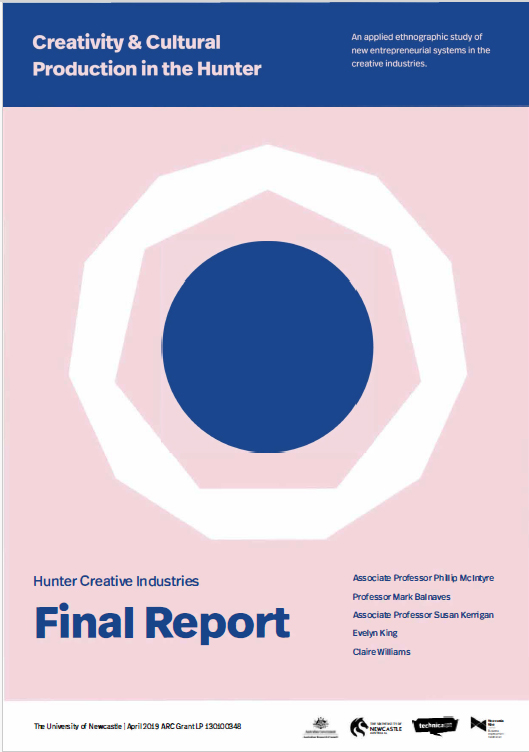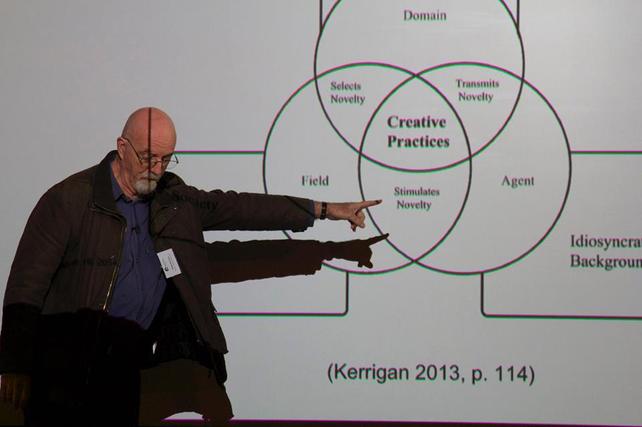
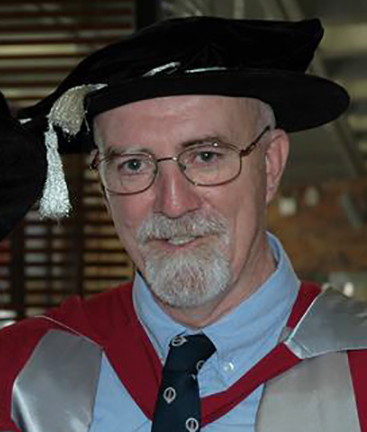
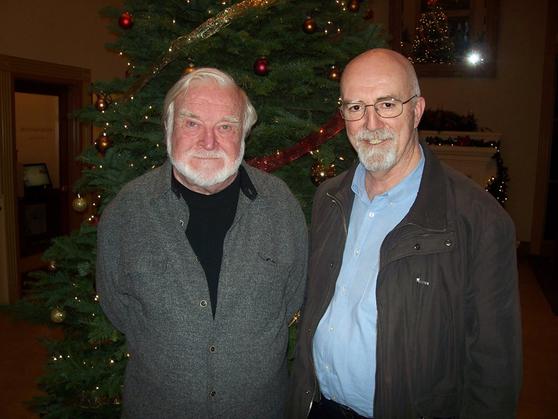

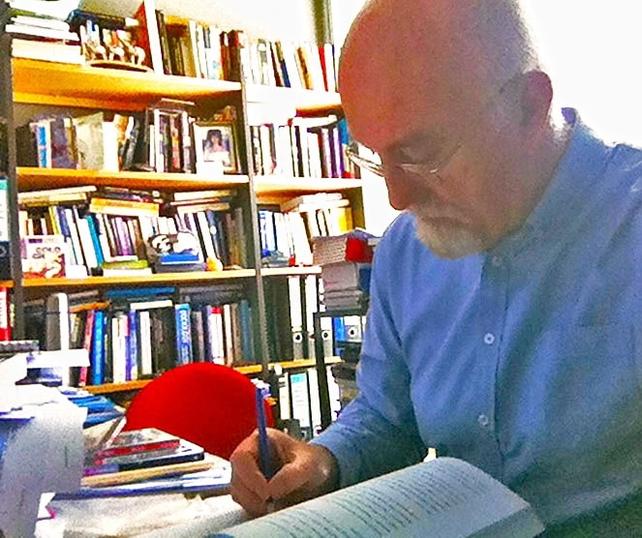
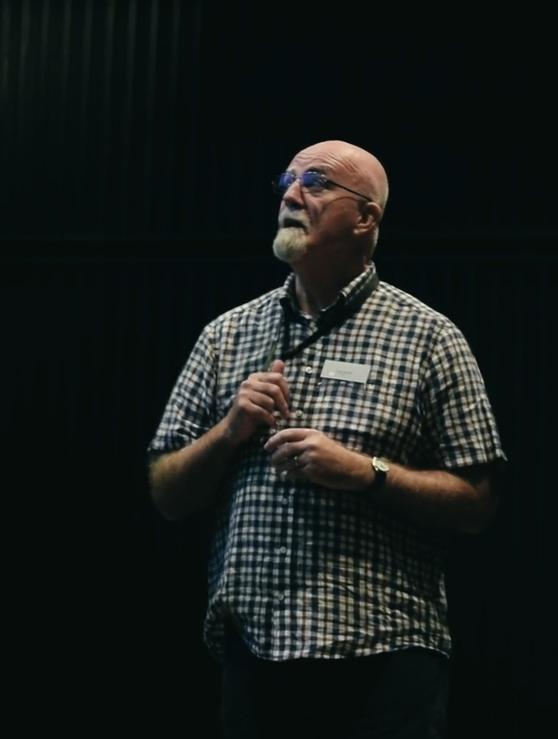
Career
Professor Phillip McIntyre is a Communication and Media scholar who researches creativity and cultural production.
Phillip is a prolific researcher. He has been involved in external and internal grants valued at $1,363,594 of which the University of Newcastle is in receipt of $854,350. His publication record includes seven books, 26 book chapters, 39 journal articles, 49 conference publications, 32 creative works and 11 reports.
He has been described as a founding voice in the new field of Songwriting Studies and his long term work on creative systems in action has also been central to the development, application and publication of an innovative approach to teaching in HE called Systems Centred Learning (SCL). He has published a book about this topic. Phillip was also part of a team that developed an extended-mixed methods approach to researching the creative industries.
Phillip was the Head of Discipline for Communication and Media at the University of Newcastle for nine years where he had the responsibility of overseeing teaching and research matters within the discipline of Communication.
He was instrumental in forming the Communication and Media Research (CAMR) group at the University, setting up the international Creativity in Higher Education Network (CHEN) and, more recently, was the Group Leader of the Future Work Research Group. He has led the Creativity and Creative Industries research team at Newcastle for quite a number of years.
Phillip has supervised 28 PhD and Master students and received an Excellence in Research Supervision Award from the Vice Chancellor.
He was awarded his PhD in Media and Communication in March 2004 from Macquarie University.
Research Expertise
At heart, Phillip researches the fundamentals of how novel and valued things are created by human beings.
He seeks to answer a basic research question: what is the most rational and evidence-based way to explain how novel things are bought into being particularly within the creative industries?
In addition to this basic research question, he also seeks to answer an applied question:
"How can these explanations help to increase humankind’s ability to generate unique and valued products, processes and ideas?"
In short, he researches the phenomenon of creativity and innovation.
With his research centred on creativity and cultural production, he was the first to take up a systems-based unification of psychological and sociological approaches to creativity and cultural production. He did this through his unique interdisciplinary amalgamation of Mihaly Csikszentmihalyi's and Pierre Bourdieu's work.
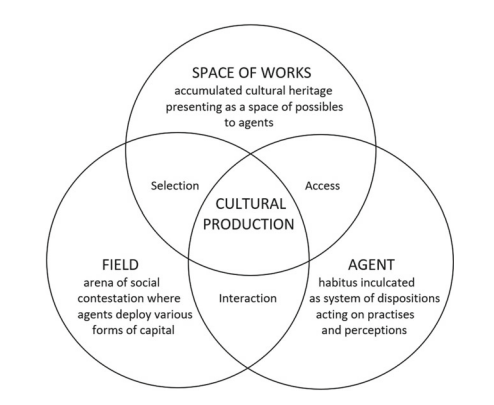
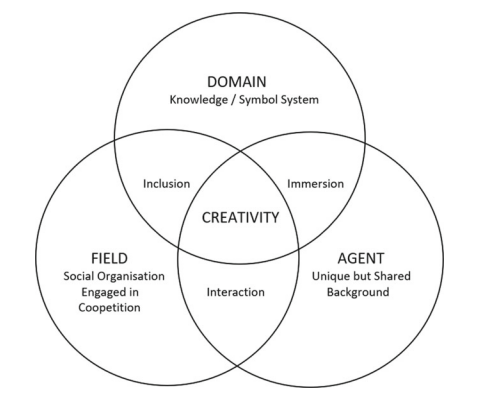
Representation of Bourdieu's complex approach to cultural production | Reconceptualising the systems model of creativity as a creative system in action
Phillip has also published a new systems model of communication which synthesizes the best aspects of the classic transmission model and the more contemporary cultural context model of communication.
This thinking was triggered by his early work on songwriting and creativity which located him as the first scholar to investigate this central artefact, one that drives the popular music industry.
Phillip led the Hunter Creative Industries as an Entrepreneurial System project which was primarily funded by an Australian Research Council (ARC) Linkage Grant. He was also a CI on the nationally focused Creative Hotspots ARC project with colleagues from University of Newcastle and Queensland University of Technology.
His current ARC grant is Saving our Species: Creating Systemic Change in Regional Communities, a project in partnership with Griffiths University and several industry partners.
Methodological approach
Phillip’s methodological approach to his research is primarily centred on ethnography which usually involves participant observation and significant numbers of in-depth interviews, triangulated with artefact analysis. There is a strong statistical element to his later ethnographic research.
Apart from this ongoing ethnographic research focus, which he has extended to other creative fields apart from songwriting, he also has an interest in the use of innovative research methods to examine the creative process, such as Practitioner Based Enquiry (PBE).
He is now working on what has been called Extended-Mixed Methods (EMM), combining qualitative, quantitative and practice-based approaches to give a comprehensive account of his objects of study.
Industry experience
Phillip continues his own creative practice.
He continues to maintain his professional audio and digital skills by engineering and producing popular music recordings for Newcastle based musicians, drawing on professional projects like these to reinforce his teaching.
Previously Phillip McIntyre was involved in the music industry as a songwriter, performing musician, producer, audio engineer and manager for various musical groups dealing with promoters, record companies and distribution labels.
As well as playing hundreds of gigs as a performer he managed a section of a large music retailer and his work as a music journalist entailed interviewing and writing feature stories on a wide range of musicians including David Bowie, John Fogerty, Paul Kelly, Don Walker, Daniel Johns, Mandawuy Yunupingu, Tim Rogers and many others.
For a short time, he produced and presented a local music radio program on 2NUR FM. As well as running a production business for live performers a number of the music videos he produced, directed and edited have been broadcast on ABCTV and he continues to produce and engineer music recordings for local artists.
A radio documentary series he co-produced, made about the wine industry for ABC Radio, was funded by the ABC's Regional Production Fund.
He has taught in the Ausmusic Basic Music Industry Skills course at TAFE, which included Daniel Johns from Silverchair as a student in the songwriting course he taught, as well as teaching courses for the Music Industry Training Package at WEA.
His latest album of songs was released in 2018 and an EP of AI inspired tunes was released in 2020. Both are available on iTunes, Spotfiy, Pandora and a host of other online streaming and subscriptions services.
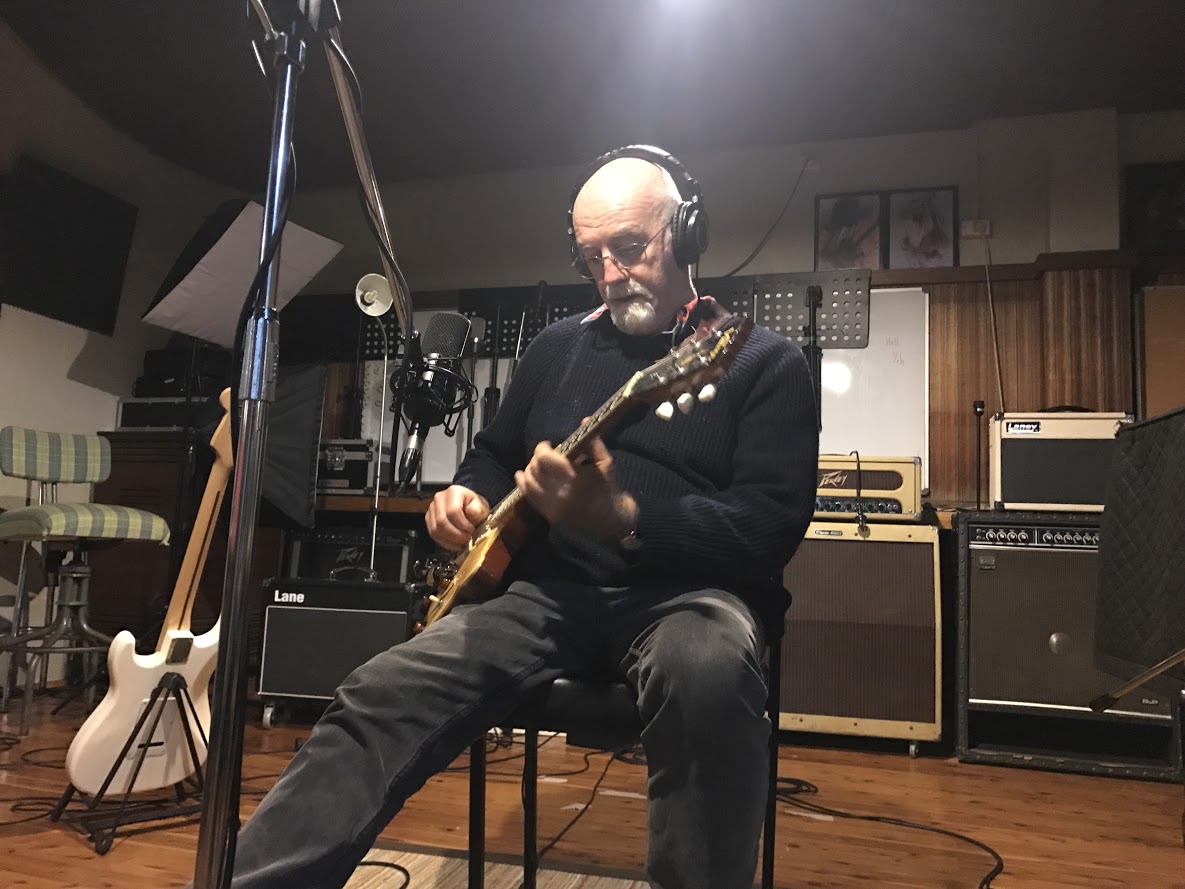
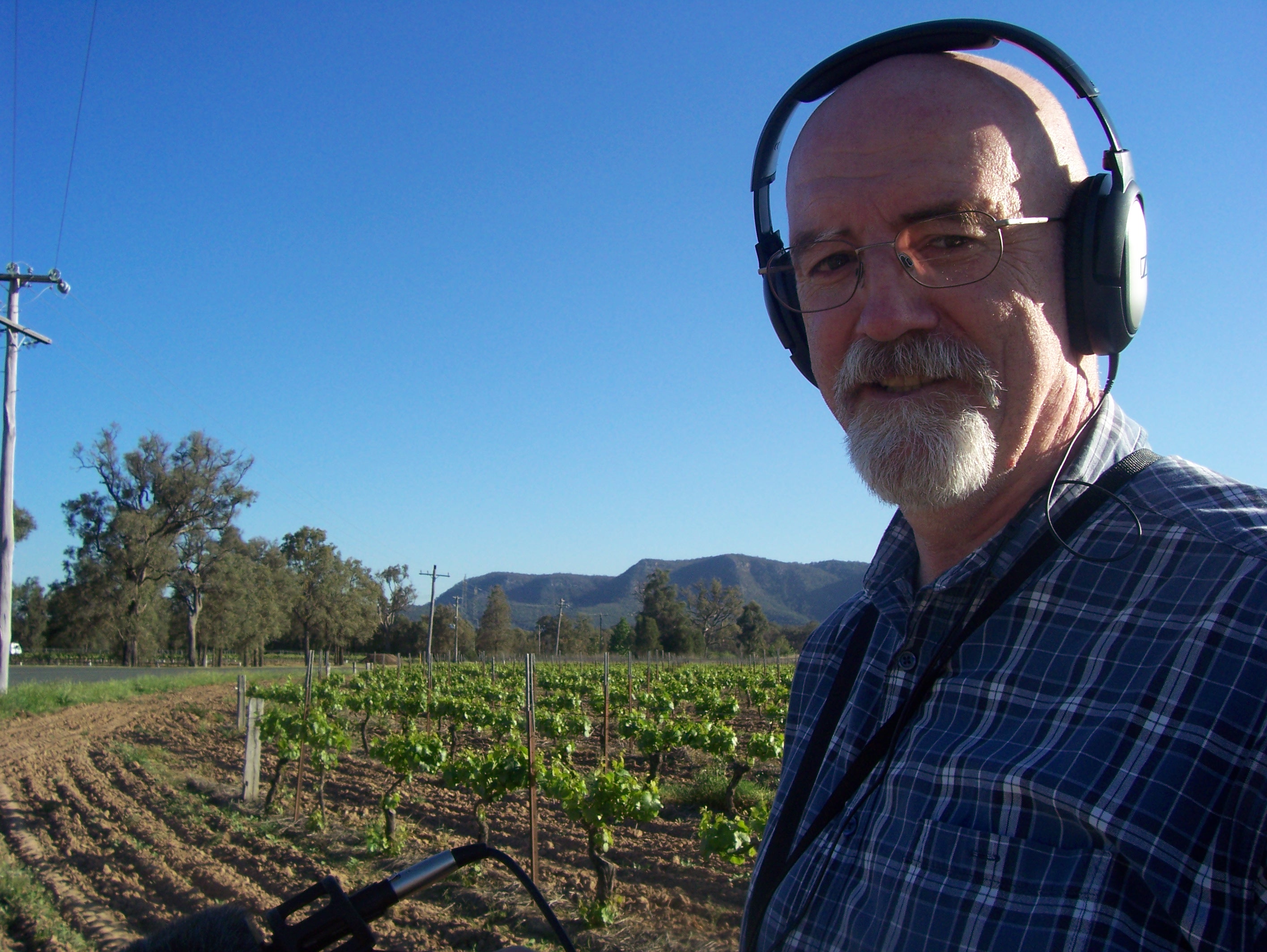
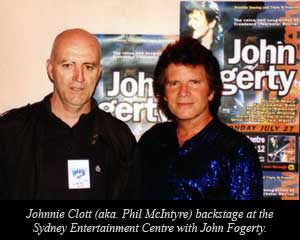
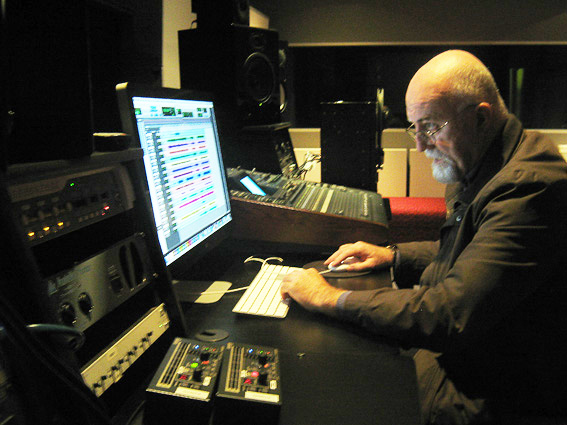
Teaching expertise
Phillip taught media production and media studies courses in the Bachelor of Communication program at UON melding his research approach into his teaching.
McIntyre's SFT and SFC scores have been consistently high and he has received commendations from the PVC for his contribution to teaching in the Faculty. He undertook and completed the Graduate Certificate in Tertiary Teaching in 2005.
He has, along with his colleagues, Dr Janet Fulton, Dr Elizabeth Paton, Prof Susan Kerrigan and Dr Michael Meany, developed and published what has been called Systems Centered Learning (SCL). The SCL approach, which is grounded in the research literature on creativity, has been applied to the teaching of creative media practice in this and one other institution in Australia as well as in Singapore. It allows teachers to set the conditions for students to be creative in, while facilitating an ever-increasing sense of the student's own growing abilities as they work inside an action-based creative system.
The incorporation of fundamental research-based ideas on creativity at a pragmatic educational level is the subject of Phillip’s co-written book, Educating for Creativity within Higher Education published by Palgrave MacMillan in 2018. Future Fellow, Professor Daniel X. Harris from the School of Education at RMIT, described the book as:
"that most useful of texts which gives the reader - even if you don't know it yet - everything you need to build your broad field knowledge about creativity in education, but also one model for improving its presence in higher education...such theoretically informed, practically oriented, and robustly tested models of creativity education will increasingly change the field for the better" (in McIntyre et.al 2018, pp. vii and ix).
This Systems Centred Learning (SCL) approach to andragogy allows educators to set the conditions for students to be creative in. This approach to teaching has been described as "theoretically informed, practically oriented, and robustly tested" (Harris in McIntyre et.al 2018, pp. ix).
It should also be noted here that Phillip’s research into creativity has also driven much of the focus of teaching in the Communication undergraduate and postgraduate programs at UON, particularly in the media production stream.
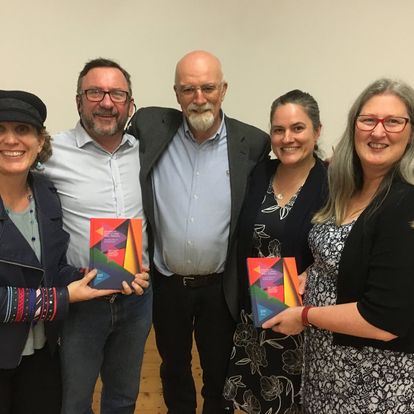
Educating for Creativity in Higher Education launch
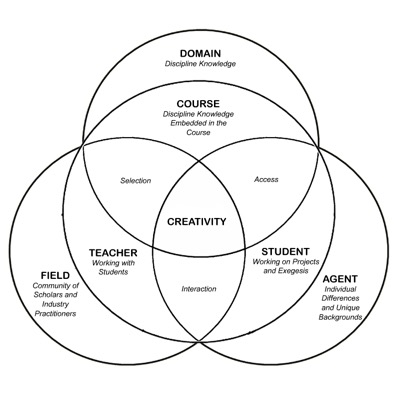
Systems Centred Learning Model
Path to teaching
When Phillip commenced studying for his Bachelor of Arts (Communication Studies) Honours degree as a mature age student at the University of Newcastle in 1994, he was asked to lecture at the same time into the Communication & Media Arts program at the University.
Following this Honours year, he continued to lecture and tutor as a contracted and sessional academic in a variety of courses at the University for the Department of Sociology and Anthropology, the Department of Leisure and Tourism as well as continuing to teach into the Communication and Media program.
At this time, he also taught into the BMIS Music Industry Skills course at the Hunter Institute of Higher Education (TAFE). He has also taught courses in the Music Industry Training Package for WEA. After achieving a full-time continuing position at the University of Newcastle he has taught into a significant number of courses in the Communication and Media program.
Teaching philosophy
His teaching philosophy encompasses an observable congruence between theoretical understanding and professional practice.
He believes practice and theory are intimately intertwined. It is hard to teach young professionals how to be pragmatically creative, something they will be required to on a daily basis within the creative industries, without understanding what creativity is.
His emphasis on mentoring, a process Dr McIntyre has eagerly engaged in, is premised on the realisation that learning can be facilitated through interactions built on concrete experience, reflective observation, abstract conceptualisation and active experimentation. This approach dovetails well with the overall WIL and Authentic Assessment approaches espoused by the University.
Innovative courses
Course: CMNS3310 Communication, Creativity and Cultural Production
His teaching of CMNS3310 Communication, Creativity and Cultural Production, an innovative course completely unique to this University and set up, taught and coordinated by Dr McIntyre, has been described by students in the following ways:
“So far I think it has been the most valuable course in equipping me for the real world. It's simultaneously depressing (in that creativity loses that element of romantic magic) but also completely inspiring in that creativity is now something honed, encouraged, developed, self-determined (well, to a degree) and entirely achievable. The course has almost re-framed my outlook on what work is, what it means to create. I'm really grateful I did the course now too in my second year. It means being injected with a new motivation for completing sometimes mundane university projects (in that everything I do and learn is a building block to innovation) and also looking out to entering the workforce which I have already done with a healthier attitude”.
“I also wish to add how refreshing it is to meet a lecturer and tutor of your kind. Over the course of my degree I have only been tutored by you twice but both classes were indeed an incredible experience. I think what I most appreciate is how you teach, your intricate methods and how you treat all of us with respect. I cannot imagine how hard it is to try and keep your students actively participating over the years but I just thought I would say that your efforts do not go unnoticed”.
“Thank you for a great semester. I find your subjects hard however feel I always learn so much, thanks for always being so helpful (your composure in class is admirable)!"
Course: CMNS1130 MP: Sound Production
To highlight another aspect of his teaching practice Dr McIntyre recently took part in an Authentic Assessment Expo showcasing, among others, his teaching approach to the course CMNS1130 MP: Sound Production. This course, with assessment tasks that replicate real world media industry experiences, has received exceptional qualitative feedback from students:
“I have never done a course that was so relevant to my goals. This helped me to want to learn and love what I was learning and doing. Nothing was a chore, it was all informative and fantastic for my learning”
“Definitely come a long way since the start of term - skills have increased tenfold”
“This course pretty much fulfilled all my expectations and was not only educational, but extremely fun at the same time”
“Assessments were very well set out and covered a wide variety of topics that have greatly increased my knowledge”
“The assessment items were challenging but in a good way. They helped me learn about production methods and also how to mix on my own with ProTools 10. The opportunity to create our own sound environments is also an interesting and new challenge”
“Great course, relevant topics, good teaching and I have learned a lot. The assessments were well set out to cover all areas. XXXX is very knowledgeable and I enjoyed the tutes for the latter end as it allowed us to keep going through mixing and ask questions”
“Everything was brilliant.”
Feedback from the UON Teaching Learning Committee about this Authentic Assessment approach was also extremely positive with the Deputy Vice Chancellor (Academic) Professor Darrell Evans citing the work on display at the Expo “as exemplary of what he wants to see going on in teaching and learning at UON both in terms of authentic assessment but also peer (staff) support and exchange of ideas and learning”. This work has been made available as learning resources for the broader university which allows other teachers like Dr McIntyre to “consolidate our reputation for best practice and innovation”.
Course: CMNS2800 Creative Industries Entrepreneurship
Another innovative course Phillip has been instrumental in developing and delivering is CMNS2800 Creative Industries Entrepreneurship. This course was built to be modularised and capable of being digitally delivered and put together to impart the knowledge and skills students will need when they attempt to gain an income rather than gain employment in the creative industries.
Given the various reports on the future of work this course was a timely addition to the core courses of the Communication program.
A pitch presentation done using mobile phone technology, along with a business plan built around an income generating venture within the creative industries, is required of the students as well as a detailed industry report of the area they wish to work in. The intellectual component of the course, built around an understanding of globalisation and digitisation and other fundamental drivers of disruptive change, is tested via an essay. All of these tasks can be delivered and assessed via digital learning platforms.
Administrative expertise
Phillip has worked at the University of Newcastle since 1994 and, in that time, held a significant number of administrative roles.
As the Head of Discipline of Communication and Media for nine years Phillip had broad oversight of the University of Newcastle’s Bachelor of Communication program. He was responsible for monitoring its success, as well as taking a strategic approach to not only the planning of teaching and staffing matters but also the guidance and mentoring of staff into successful research programs.
Phillip’s administrative expertise includes the following key roles at University, Faculty, School, Discipline and Program level at the University of Newcastle:
Member of the Faculty of Education and Arts Faculty Board representing the School of Creative Industries (SOCI).
Member of the Faculty of Science and IT (FSIT) Faculty Research and Research Training.
Member of the DCIT Research Committee and has been a member of the School of DCIT RHD Progress Committee as well as sitting on the School's CT&L Committee.
The Executive Committees of the Schools of Design, Communication and IT (DCIT) and SOCI.
Member of the SOCI Professoriate, an active group dealing with research strategies.
Member of the SOCI Research Training Committee.
Acting Head of Department in 2001.
Program Convenor for the Communication and Media Honours Program in FSIT and in this role he was the Chair, Bachelor of Communication (Honours) Program Review Committee for the FSIT in 2004.
Program Convenor role for the Communication and Media Honours Program in SOCI.
The VC's Representative on the Advisory Board of the University radio station 2NURFM which he did for ten years. That board had the responsibility of overseeing the ongoing financial stability of the station.
Chair of the Peter Pickhover Trust Fund Committee that reports to that Board.
Phillip was the President of the Australian and New Zealand Communication Association (ANZCA) from 2016 to 2017 and is a current member of the International Communication Association (ICA) and the Association for the Study of the Art of Record Production (ASARP). He sits on the Editorial Board of the Journal of the Art of Record Production (JARP) and is a Senior Editor for the Journal of Undergraduate Ethnography. He has guest-edited the Global Media Journal and the Communication Research and Practice journal. He was also the Co-Convenor of the annual Australian and New Zealand Communication Conference, Creating Space in the Fifth Estate, in 2016.
Collaborations
Phillip has collaborated with industry partners TechnicaCPT and Newcastle Now on the ARC Linkage Project Creativity and Cultural Production in the Hunter. This project undertook an applied ethnographic study of key collaborative groups across all the major creative industries in the Hunter region in NSW. Mapping these industries’ approach to cultural production in the digital realm provided detailed insights into the dynamic entrepreneurial systems at the heart of creative industries and provided comprehensive baseline information on the creative industries in the region. This data did not exist prior to this study and has already had an impact on regional policy makers, industry and academia, moving their understanding of factors affecting creative output in an increasingly technological world to a fact-based position.
This research project was the subject of a media piece written by economic geographer Prof Phillip O'Neill from UWS:
“Researchers at the University of Newcastle have set high standards in their report Creativity and Cultural Production in the Hunter. It's a journey-setting document. [This] encyclopaedic 546-page report is a baseline study of the make-up of the creative and cultural industries in the Hunter. The Creativity and Cultural Production report is refreshingly different from the cash-for-comment economic analyses you see for many sectors. The report carefully explains the rich and diverse composition of the 10,000 workers in the creativity and cultural production sector and the $1 billion contribution it makes annually to the regional economy. At its core are musicians, the media, publishers, advertisers, designers, artists, the theatre, filmmakers, electronic gamers and architects. And for each paid professional there is a thick moleskin pad of amateurs, interns and volunteers, together delivering cultural products and services to a surprisingly vast Hunter audience” (O’Neill 2019, online).
The mapping of conditions favourable to creativity and innovation in the creative industries in the Hunter has been reported in the popular press, scholarly publications and conference presentations.
The research has had, as a result, a deep impact on the region so much so that Phillip and his research colleagues did very well in the recent national Impact and Engagement exercise. At the conclusion of this exercise, FoR 19, Creative Arts & Writing at the University of Newcastle (UON) received a HHH (3) score, the highest rating. Only four other institutions in the country achieved a rating like this for FoR 19. The UON Impact Case Study for FoR 19 was based on the Hunter Creative Industries as an Entrepreneurial System.
Building on the work, Phillip and his colleague A/Prof Susan Kerrigan, were awarded, along with a research team from QUT headed by Distinguished Prof Stuart Cunningham, another ARC Linkage Grant focused at identifying and explaining 'creative hotspots', like the Hunter region, but this time more broadly focused at the national level. The industry partners for this grant include Create NSW, Creative Victoria, Arts Qld, Arts SA and Arts WA. Phillip was also added as Lead CI to an ARC Discovery Grant looking at the history of popular music in WA.
His latest co-collaboration is an ARC Linkage grant with partners NSW Office of Environment & Heritage, NSW Department of Planning and Environment and the NSW Environmental Trust on the Save our Species project.
As well as these Australian collaborations Phillip has researched and published with colleagues at Leeds Beckett University, Birmingham City University and Goldsmiths College in the UK. Because of his "standing as a world authority on creativity research" he has been a keynote at a number of conferences, and he has delivered other invited public lectures, for example, at Goldsmiths College, Edinburgh University, RMIT, the University of Copenhagen, Birmingham City University and the Royal College of Music in Stockholm. He recently launched the Routledge book The Economic Philosophy of the Internet of Things (2018) for his friend and colleague economist James Juniper.
List of publications
Books
Phillip has written, co-written and edited books in creativity and cultural production.
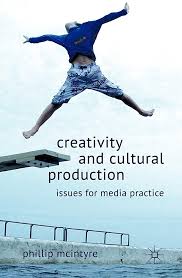
Phillip's sole authored A1 book, Creativity and cultural production: Issues for media practice was published by Palgrave MacMillan in 2012.
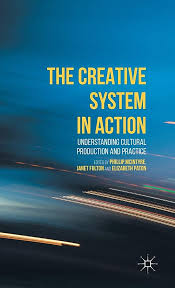
The creative system in action: Understanding cultural production and practice, co-edited with Dr Janet Fulton and Dr Elizabeth Paton, was published by the same publisher in 2016.
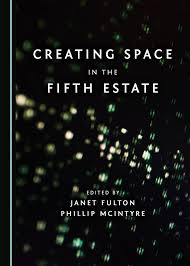
Creating space in the Fifth Estate was co-edited with Dr Janet Fulton and was developed from the 2016 ANZCA conference and published in 2017.
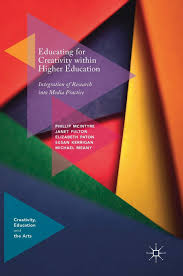
Educating for creativity within higher education: integration of research into media practice was co-authored with Dr Janet Fulton, Dr Elizabeth Paton, Professor Susan Kerrigan and Dr Michael Meany in 2018.
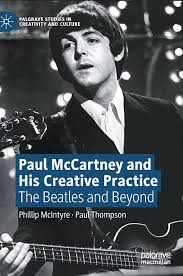
Paul McCartney and his creative practice: The Beatles and beyond was published in 2021 and co-written with Paul Thompson, a Reader from Leeds Beckett University in the UK.
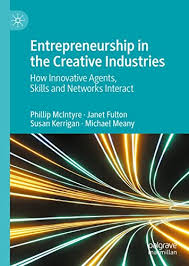
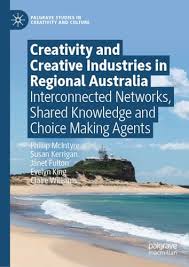
Creativity and creative industries in regional Australia: Interconnected networks, shared knowledge and choice making agents, pubished in 2024 and co-written with Prof Susan Kerrigan, Dr Janet Fulton, Evelyn King and Clare Williams.
Books - Accolades and acknowledgements
Phillip's books have been well received with acknowledgements from the leading scholars in the field and positive reviews in scholarly journals.
Creativity and cultural production: Issues for media practice was reviewed in Media International Australia by Emily van der Nagel
“Phillip McIntyre gives a thorough overview of the tensions present when thinking about and working within creative industries…McIntyre explores differing theories of creativity. Neatly divided into theoretical and practical sections, Part I investigates the creator as genius, biopsychological perspectives, and social and cultural views of creativity before McIntyre concludes that the best reconceptualization of creativity may lie ‘not in any one of these single positions, but in the confluence of a number of them’ (p. 69)…Part II follows this thread through issues in radio, journalism, television, film, photography and popular music before providing an up-to-date overview of copyright and intellectual property issues in his chapter on the digital revolution…McIntyre sustains a clear argument throughout the book, drawing together a wide range of both traditional and contemporary material to illustrate his claims…However, it is not the case studies that dominate, but the ideas – such as the ‘habitus’, or ‘feel for the game’ (p. 72) that all creative minds possess, or the idea that structural constraints placed upon creativity are in fact precisely what enables it to occur at all” (van der Nagel 2012, p. 178).
The late Distinguished Professor Mihaly Csikszentmihalyi wrote a foreword for Educating for creativity within higher education: Integration of research into media practice. He recognised the work of University of Newcastle's creativity and creative industries research team.
The group of researchers at Newcastle who contributed to this book are at the forefront of scholarship dedicated to understanding how humankind has been using creativity in the past, and how the process can be supported in the future. To my knowledge, there has been no previous center anywhere on the planet where such a close-knit and dedicated group of scholars has existed quite like this one.
Acknowledgements for Paul McCartney and his creative practice: The Beatles and beyond.
“Paul McCartney and his Creative Practice is a valuable case study for any researcher (in any field), who is interested in the creative process. For students, it illustrates how theoretical frameworks help us to understand and explain real world phenomena. For musical practitioners and McCartney fans, it offers new perspective on the artistry and contributions of a creative giant. It is one thing to assert that romantic explanations of creative process are baseless, and it is another thing to systematically pick apart the problems with such interpretations. Paul McCartney and his Creative Practice demonstrates how creativity actually works using in-depth explanations of its many ascertainable, testable mechanisms; a highly evolved theoretical framework; the work of a singular creative genius and comprehensive research on their subject.”
A/Prof Nyssim Lefford – Dept of Social Sciences, Technology and Arts, Luleå University of Technology, Sweden.
“In this holistic exploration of the creative process of Paul McCartney, McIntyre and Thompson have not only illuminated the work of one of the world's greatest songwriters, but also made a significant intervention in the study of songwriting and creative practice. This richly contextualised study, which takes in everything from Greek mythology to contemporary psychology in its framing, builds upon the systems model of creativity in order to unpack the former Beatle's creative process. Going far beyond the scope of most scholarly work on the subject, this superb contribution allows the reader to appreciate McCartney's extraordinary creativity as a performer, songwriter and producer as a result of his immersion in a complex musical ecosystem, and without recourse to the usual myths that surround his talent."
Dr Simon Barber – Birmingham Centre for Media and Cultural Research, Birmingham School of Media, Birmingham University, UK.
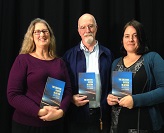

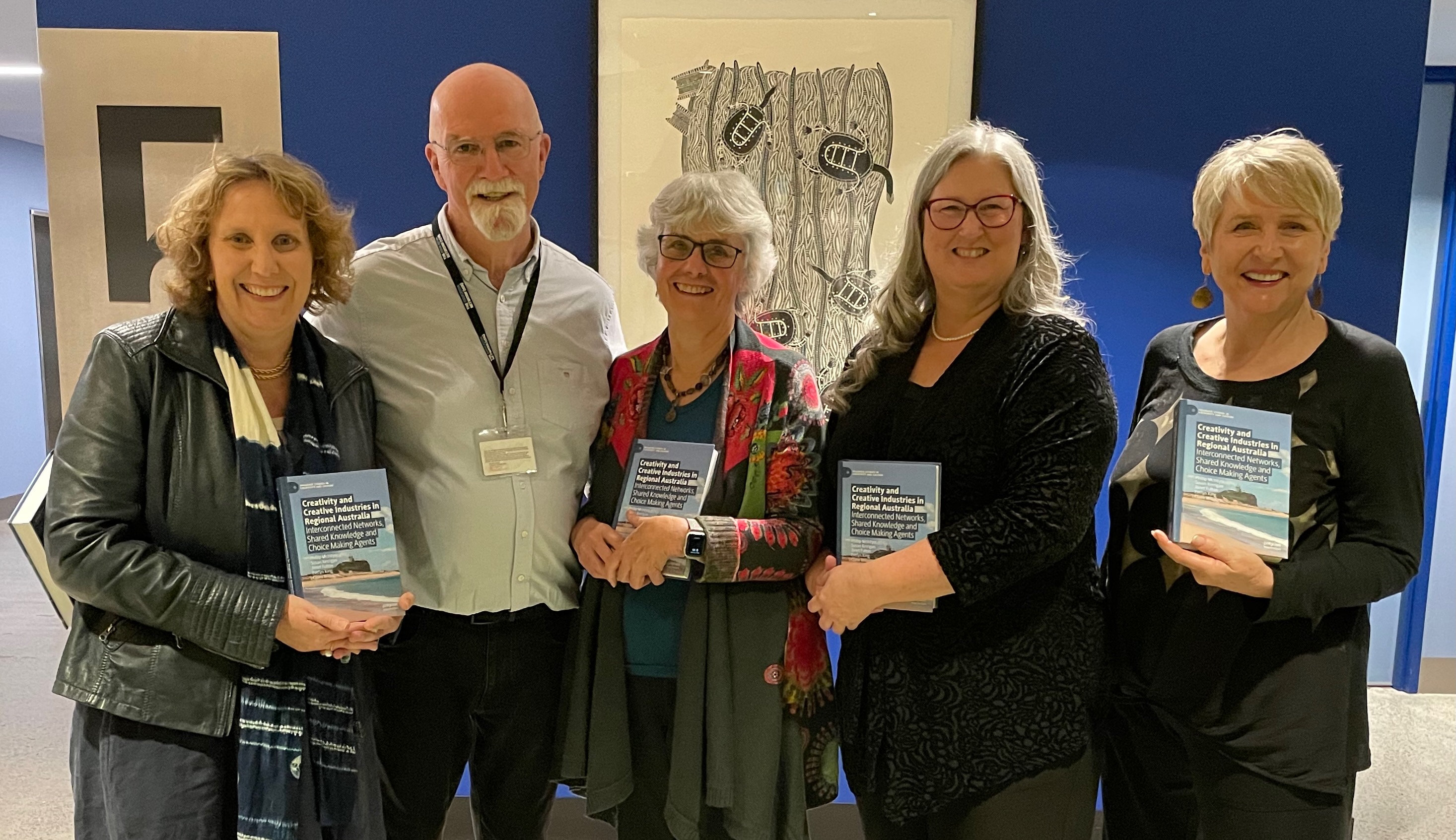
Book chapters
McIntyre, P., & Velikovsky, J. (2024). A creative system in action: Bringing video game music and sound into being. In W. Gibbons, & M. Grimshaw-Aagaard (Eds.), The Oxford Handbook of Video Game Music and Sound. Oxford Academic.
Thompson, P., & McIntyre, P. (2024). Performing rock in the recording studio: Agency and structure within creative practice. In G. Volioti, & D.G. Barolsky (Eds.), Recorded Music in Creative Practices (1 ed., pp. 105-120). Routledge. https://doi.org/10.4324/9781003190004-9
McIntyre, P. (2021). Unknowing the knowing in creative practice: Zen and the creative system in action. In C. Hight & M. Minichiello (Eds.), The Elephant s Leg: Adventures in the Creative Industries (pp. 381-401). Common Ground Publishing.
McIntyre, P. (2020). The systems approach to creative practice: The case of Supersonic 2003 2004. In S. Zagorski-Thomas, K. Isakoff, S. Lacasse, & S. Stévance (Eds.), The Art of Record Production: Creative Practice in the Studio (pp. 129-141). Routledge.
McIntyre, P., Kerrigan, S., King, E., & Williams, C. (2020). The Hunter Region: A creative system at work. In A. Luyn, & E. Fuente (Eds.), Regional Cultures, Economies, and Creativity: Innovating Through Place in Australia and Beyond (1 ed., pp. 201-222). Routledge. https://doi.org/10.4324/9780429459290-11
Thompson, P., & McIntyre, P. (2020). Sound engineering in the recording studio as creative practice. In S. Zagorski-Thomas, K. Isakoff, S. Lacasse, & S. Stévance (Eds.), The Art of Record Production: Creative Practice in the Studio (pp. 155-170). Routledge.
Kerrigan, S., & McIntyre, P. (2019). Creative filmmaking processes, procedures and practices: Embodied and internalized filmmaking agency. In C. Batty, M. Berry, K. Dooley, B. Frankham, & S. Kerrigan (Eds.), The Palgrave Handbook of Screen Production (pp. 3-17). Springer International Publishing. https://doi.org/10.1007/978-3-030-21744-0_1.
Kerrigan, S., McIntyre, P., Fulton, J., & Meany, M. (2019). Systems centered learning approach to creative practice in communication and media teaching. Encyclopedia of Educational Innovation (pp. 119-125). Springer.
McIntyre, P. (2018). Using Practitioner Based Enquiry (PBE) to examine screen production as a form of creative practice. In C. Batty, & S. Kerrigan (Eds.), Screen Production: Creative Practice as a Mode of Enquiry (pp. 85-102). Palgrave MacMillan.
Fulton, J.M., & McIntyre, P. (2017). Introduction. In J.M. Fulton & P. McIntyre (Eds.), Creating Space in the Fifth Estate (pp. 1-12). Cambridge Scholars Publishing, 1-12.
McIntyre, P., & Fulton, J.M. (2017). Conclusion. In J.M. Fulton & P. McIntyre (Eds.), Creating Space in the Fifth Estate (pp. 144-150). Cambridge Scholars Publishing.
McIntyre, P. (2016). General systems theory and creativity. In P, McIntyre, J.M. Fulton, & E. Paton (Eds.), The Creative System in Action: Understanding Cultural Production and Practice (pp. 13-26). Palgrave Macmillan.
McIntyre, P. (2016). Songwriting as a creative system in action. In P, McIntyre, J.M. Fulton, & E. Paton (Eds.), The Creative System in Action: Understanding Cultural Production and Practice (pp. 47-59). Palgrave Macmillan.
McIntyre, P., & Coffee, S. (2016) The arts and design: From romantic doxa to rational systems of creative practice. In P, McIntyre, J.M. Fulton, & E. Paton (Eds.), The Creative System in Action: Understanding Cultural Production and Practice (pp. 185-199). Palgrave Macmillan.
McIntyre, P., Fulton, J.M., & Paton, E. (2016). Introduction. In P, McIntyre, J.M. Fulton, & E. Paton (Eds.), The Creative System in Action: Understanding Cultural Production and Practice (pp. 1-12). Palgrave Macmillan.)
McIntyre, P., Fulton, J.M., & Paton, E. (2016). Conclusion: Future directions? In P, McIntyre, J.M. Fulton, & E. Paton (Eds.), The Creative System in Action: Understanding Cultural Production and Practice (pp. 200-206). Palgrave Macmillan.
McIntyre, P., Davis, B., & Kishore, V. (2014). The systems model of creativity and Indian film: A study of two young music directors from Kerala, India. In V. Kishore, A. Sarwa, & P. Patra (Eds.), Bollywood and Its Other(s): Toward New Configurations (pp. 110-129). Palgrave Macmillan. https://doi.org/10.1057/9781137426505_8
McIntyre, P. (2013). Creativity as a system in action. In K. Thomas, & J. Chan (Eds.), Handbook of Research on Creativity (pp. 84-97). Edward Elgar.
McIntyre, P. (2012). Rethinking Creativity: Record production and the systems model. In S. Frith, & S. Zargorski-Thomas (Eds.), The Art of Record Production: A Reader for a New Academic Field (pp. 149-162). Ashgate.
McIntyre, P. (2008). Songwriting, creativity and the music industry. In R.C Sickels (Ed.), The Business of Entertainment: Popular Music (pp. 1-20) Praeger Publishing.
McIntyre, P. (2003). Never mind the bullocks: The Tex Pistols and Tamworth. In P. Hayward (Ed.), Outback and Urban (pp 145-158). AICM Press.
Journal articles
Kerrigan, S., McIntyre, P., & McCutcheon, M. (2024). A creative gift economy: Pre-pandemic creative systems examined through a study of regional creative industries in Australia. Creative Industries Journal, 1-14. https://doi.org/10.1080/17510694.2024.2348771
Fulton, J.M., Kerrigan, S., & McIntyre, P. (2023). Extended-mixed methods: A new research paradigm for the creative industries. Communication Research and Practice, 9(2), 103-120. https://doi.org/10.1080/22041451.2023.2167512
Drew, Z., Fulton, J., & McIntyre, P. (2022). #foodporn: Examining Instagram food influencers through the systems model of creativity. Communication Research and Practice, 8(4), 308-326. https://doi.org/10.1080/22041451.2022.2137248
Killen, C., McIntyre, P., Drabsch, B., Cassin, A., Chalmers, A., Callen, A., et al. (2022). Communicating as community: Examining power and authority in community focused environmental communication through participatory action research in the Ourimbah Creek Valley. Platform: Journal of Media and Communication, 9(2), 6-21.
McIntyre, P. (2021). A research agenda for creative industries. Media International Australia Incorporating Culture & Policy, 181, 218-219
Kerrigan, S., McIntyre, P., Fulton, J., & Meany, M. (2020). The systemic relationship between creative failure and creative success in the creative industries. Creative Industries Journal, 13(1), 2-16. https://doi.org/10.1080/17510694.2019.1624134
Kerrigan, S., Ryan, M.D., McIntyre, P., Cunningham, S., & McCutcheon, M. (2020). The creative sustainability of screen business in the Australian regions. Studies in Australasian Cinema, 14(2), 111-129. https://doi.org/10.1080/17503175.2020.1811486
Sansom, J., Cassin, A., & McIntyre, P. (2020). Muslims in Australia: How Facebook use cultivates perceptions of “us against them” among social groups. The Journal of Communication and Media Studies, 6(1), 21-39. https://doi.org/10.18848/2470-9247/CGP/v06i01/21-39
Kerrigan, S., & McIntyre, P. (2019). Practitioner centred methodological approaches to creative media practice research. Media Practice and Education, 20(3), 211-231. https://doi.org/10.1080/25741136.2018.1464733
McIntyre, P. (2019). Taking creativity seriously: Developing as a researcher and teacher of songwriting. Journal of Popular Music Education, 3(1), 67-85. https://doi.org/10.1386/jpme.3.1.67_1
McIntyre, P., Paton, E., Gleadhill, D. (2017). The system of book creation: Intellectual property and the self-publishing sector of the creative industries. Creative Industries Journal, (10), 191-210.
McIntyre, P. (2016). What is the fifth estate and why does it matter?: Digitisation, globalisation, and neoliberalism and their part in the creation of a rapidly changing world. Communication Research and Practice, 2(4), 437-450. https://doi.org/10.1080/22041451.2016.1260084
McIntyre, P. (2015). Tradition and Innovation in creative studio practice: The use of older gear, processes and ideas in conjunction with digital technologies. Journal on the Art of Record Production(9).
McIntyre, P., & Kerrigan, S. (2014). Pursuing extreme romance: change and continuity in the creative screen industries in the Hunter Valley. Studies in Australasian Cinema, 8(2-3), 133-149. https://doi.org/10.1080/17503175.2014.960680
Morey, J., & McIntyre, P. (2014). The creative studio practice of contemporary dance music sampling composers. Dancecult, 6(1), 41-60. https://doi.org/10.12801/1947-5403.2014.06.01.03
Fulton, J.M., & McIntyre, P. (2013a). Futures of Communication: Communication Studies∼Creativity. The Review of Communication, 13(4), 269-289. https://doi.org/10.1080/15358593.2013.872805
Fulton, J.M., & McIntyre, P. (2013b). Journalists on journalism: Print journalists' discussion of their creative process. Journalism Practice, 7(1), 17-32. https://doi.org/10.1080/17512786.2012.657901
McIntyre, P. (2013a). Rethinking creative practice in record production and studio recording education: Addressing the field. Journal on the Art of Record Production (8).
McIntyre, P. (2013b). Examining creativity and cultural production: Screen based media and the current research into creativity. Interactive Media: Ejournal of the National Academy of Screen& Sound, (9), 1-17.
McIntyre, P., & Sheather, G. (2013). The Newcastle music industry: An ethnographic study of a regional creative system in action. International Journal of Music Business Research, 2(2), 36-60.
Sheather, G., & McIntyre, P. (2013). The making of identity and its relation to place and success: The case of ‘mainstream’ popular music in Newcastle NSW, 1973–1988. Popular Music History, 8(3), 270-288. https://doi.org/10.1558/pomh.v8i3.20270
McIntyre, P. (2012). Constraining and enabling creativity: The theoretical ideas surrounding creativity, agency and structure. The International Journal of Creativity and Problem Solving, 22(1), 43-60.
McIntyre, P., & Morey, J. (2012). Examining the impact of multiple technological, legal, social and cultural factors on the creative practice of sampling record producers in Britain. Journal on the Art of Record Production (7).
McIntyre, P. (2011a). Rethinking the creative process: The systems model of creativity applied to popular songwriting. Journal of Music, Technology and Education, 4(1), 77-90. https://doi.org/10.1386/jmte.4.1.77_1
McIntyre, P. (2011b). Systemic creativity: The partnership of John Lennon and Paul McCartney. Musicology Australia, 33(2), 241-254. https://doi.org/10.1080/08145857.2011.596142
Morey, J., & McIntyre, P. (2011). 'Working out the split': Creative collaboration and assignation of copyright across differing musical worlds. Journal on the Art of Record Production, 1-8.
Kerrigan, S., & McIntyre, P. (2010). The 'creative treatment of actuality': Rationalizing and reconceptualizing the notion of creativity for documentary practice. Journal of Media Practice, 11(2), 111-130. https://doi.org/10.1386/jmpr.11.2.111_1
McIntyre, P. (2008a). Creativity and cultural production: A study of contemporary Western popular music songwriting. Creativity Research Journal, 20(1), 40-52. https://doi.org/10.1080/10400410701841898
McIntyre, P. (2008b). Creativity and cultural production: An interdisciplinary approach to understanding creativity through an ethnographic study of songwriting. Cultural Science, 1(2). https://doi.org/10.5334/csci.10
McIntyre, P. (2008c). The systems model of creativity: Analyzing the distribution of power in the studio. Journal on the Art of Record Production (3).
McIntyre, P., & Paton, B. (2008). The mastering process and the systems model of creativity.Perfect Beat, 8(4), 64-81. https://doi.org/10.1558/prbt.v8i4.28691
McIntyre, P. (2007). Copyright and creativity: changing paradigms and the implications for intellectual property and the music industry. Media International Australia Incorporating Culture & Policy, 123(123), 82-94. https://doi.org/10.1177/1329878X0712300109
McIntyre, P., & McIntyre, E. (2007a). Rethinking creativity and approaches to teaching. The International Journal of the Book, 4(3), 13-20. https://doi.org/10.18848/1447-9516/CGP/v04i03/36592
McIntyre, P., & McIntyre, E. (2007b). Rethinking creativity and approaches to teaching: The systems model and creative writing. The International Journal of the Book, 4(3), 13. https://doi.org/10.18848/1447-9516/CGP/v04i03/36592
McIntyre, P. (2006). Paul McCartney and the creation of ‘Yesterday’: the systems model in operation. Popular music, 25(2), 201-219. https://doi.org/10.1017/S0261143006000936
McIntyre, P. (2004). Review of Jason Toynbee (2002) ‘Making Popular Music: Musicians Creativity and Institutions’. Perfect Beat: The Pacific Journal of Research into Contemporary Music and Popular Culture, 6.
McIntyre, P. (2001). The domain of songwriters: Towards defining the term 'song'. Perfect Beat: The Pacific Journal of Research into Contemporary Music and Popular Culture, 5(N3), 100-111.
Conferences
Fulton, J. & McIntyre, P. (2009) ‘Creativity: A Keyword in Print Journalism’, Proceedings of the 59th Annual Meeting of the International Communication Association: Keywords in Communication, in: All Academic Research, (paper #300429, pp 1-26 ) 21-25 May 2009, Chicago.
McIntyre, P. (1999) ‘The Domain of Songwriters: Toward a Definition of ‘Song’’ in Tony Mitchell and Peter Doyle (eds) Changing Sounds: New Directions and Configurations in Popular Music (IASPM 1999 International Conference Proceedings), University of Technology, Sydney (ISBN 1-86365-364-3).
McIntyre, P. (2001) ‘The Contemporary Popular Music Industry as Field’ in Denis Crowdy, Shane Homan, Tony Mitchell (eds) Musical In-Between-ness: Proceedings of 8th Conference of the Australia-NZ Branch of the International Association for the Study of Popular Music, University of Technology, Sydney (ISBN 0-9581497-0-4).
McIntyre, P. (2006) 'Creative Practice as Research: "Testing Out" the Systems Model of Creativity through Practitioner Based Enquiry' in Richard Vellla (ed) Speculation and Innovation: Applying Practice Led Research in the Creative Industries, Queensland University of Technology. Retrieved 4/8/06 from the World Wide Web: http://www.speculation2005.net [ISBN: 1 74107 1313].
Mcintyre, P. (2006) ‘Radio Program Directors, Music Directors and the Creation of Popular Music’, in Sianan Healy, Bruce Berryman & David Goodman (eds) Radio in the World: Radio Conference 2005 pp: 449-460, RMIT Publishing, Melbourne, <http://search.informit.com.au/documentSummary;dn=039631737079357;res=E-LIBRARY> (23 Jan 06) (ISBN:1921166126)
McIntyre, P. (2007) ‘Rethinking Creativity: Record Production and the Systems Model’, 3rd Art of Record Production International Conference, Queensland University of Technology, Brisbane Dec 10-11. 2007 (to be published as a special edition of the Journal on the Art of Record Production http://www.artofrecordproduction.com/content/view/62/95/ ) (in press- accepted 13/8/08).
McIntyre, P. (2007) ‘Learning to be Songwriters: Creativity, the Systems Model and Domain Acquisition’, Sounds and Selves: Selected Proceedings from the 2005 IASPM Australia/New Zealand Conference (edited by Ian Collinson and Mark Evans) [Sydney, N.S.W.] : IASPM and Perfect Beat Pub., c2007. ISBN 9780975774717
McIntyre, P. (2008) ‘The Systems Model of Creativity: Analyzing the Distribution of Power in the Studio’, 4th Art of Record Production International Conference, University of Massachusetts, Lowell, Nov 2008: published in Journal of the Art of Record Production, Issue 4: Supplement to ARP08, The Peer - Reviewed Proceedings of the 2008 Art of Record Production Conference http://www.artofrecordproduction.com/content/view/214/126/
McIntyre, P. (2009) ‘Rethinking the Idea of the Mainstream/Alternative Dichotomy in Contemporary Western Popular Music in the Light of Recent Research into Creativity’ in Strong, C and Phillipov, M, eds. (2009) Stuck in the Middle: The Mainstream and its Discontents, Selected Proceedings of the 2008 IASPM-ANZ Conference. IASPM-ANZ. ISBN 978-0-9581497-1-6.
McIntyre, P. (2009) ‘Rethinking Communication, Creativity and Cultural Production: Outlining Issues for Media Practice’, in T. Flew (Ed.) Communication, Creativity and Global Citizenship: Refereed Proceedings of the Australian and New Zealand Communications Association Annual Conference, Brisbane, July 8-10. ISBN 987-1-74107-275-4. Available at: http://www.proceedings.anzca09.org
McIntyre, P (2010) ‘Communication and the Creation of Media Content: A Practitioner-Based Enquiry Study of Popular Music Songwriting’ in K. Macallum (Ed.) ANZCA 2010 Conference: Media, Democracy and Change, University of Canberra, Canberra, 7-9 July.
McIntyre, P. (2011) ‘Bringing Novelty into Being: Exploring the Relationship Between ‘Creativity’ and ‘Innovation’’, ANZCA 2011 – Communication on the Edge: Shifting Boundaries And Identities, The University of Waikato, Hamilton, New Zealand, 6-8 July 2011, http://www.anzca.net/conferences/anzca11-proceedings.html.
McIntyre, P. (2012) ‘An Overview of Communication Theory: From Transmission Models to Creative Systems’, Anyanwu, C. & Green, K. (eds) ANZCA 2012 Adelaide: Communicating Change and Changing Communication in the 21st Century Conference Proceedings, University of Adelaide/ University of South Australia, Adelaide, July 2012.
McIntyre, P. (2012) ‘Examining Creativity and Cultural Production: Screen-Based Media and the Current Research into Creativity’ 2012 ASPERA Annual Conference, Creativity: The Measurable and the Immeasurable, Queensland University of Technology, Brisbane, QLD, 2 July - 5 July, 2012.
McIntyre (2013) ‘Creativity and Creative Industries: From Romanticism to Idiosyncratic Agency, Social Networks and Knowledge Systems’, Global Networks – Global Divides: Bridging New and Traditional Communication Challenges ANZCA, Murdoch University, Perth 3rd – 5th July 2013.
McIntyre, P. & Morey, J. (2011) ‘‘Working out the Split’: Creative Collaboration and Assignation of Copyright across Differing Musical Worlds’, 5th Art of Record Production International Conference, Leeds Metropolitan University, Leeds UK, Dec 2010 in Journal on the Art of Record Production, Issue 5 http://arpjournal.com/content/issue-5/
Paton, B. & McIntyre, P. (2009) ‘Audio Mastering: Experimenting on the Creative System of Music Production’ The Second International Conference on Music Communication Science, 3-4 December 2009, Sydney, Australia http://marcs.uws.edu.au/links/ICoMusic09/index.html pp75-78.
Regan, B., Nesbitt, K. & Mcintyre, P. (2011) ‘Incorporating Practitioner Based Enquiry into Software Development Research’, 15th Pacific Asia Conference on Information Systems (PACIS 2011), Queensland University of Technology/University of Queensland Business School, Brisbane, July, http://mlaa.com.au/pacis2011/proceedings.htm
Thompson, P. & McIntyre, P. (2013) ‘Rethinking Creative Practice in Record Production and Studio Recording Education: Addressing the Field, JARP Issue 8: 8th ARP Conference Proceedings, Universite Laval, Quebec City, Canada, 1-3 May.
Full Written Non-refereed Conference Papers
McIntyre, P. (1995) ‘Newcastle Songwriters: Locally Rooted but World Citizens’, Tolerance, Diversity and Social Inequality: The Australian Sociological Association (TASA) National Conference, Newcastle, December 4-8.
McIntyre, P. (1995) ‘The Creative Processes of Published Songwriters in Newcastle N.S.W.’Popular Music: Places and Spaces, IASPM Australian-New Zealand Conference, Melbourne, June.
McIntyre, P. (2002) ‘The Creation of Paul McCartney’s Yesterday: Romanticism or Rationalism?’ 25th National Conference of the Musicological Society of Australia, Newcastle.
McIntyre, P. (2002) ‘Never Mind the Bullocks: The Tex Pistols and Tamworth’ Inaugural Country Music Conference of the Australian Institute of Country Music, Gympie Qld.
McIntyre, P. (2005) ‘Learning to be Songwriters: Creativity, the Systems Model and Domain Acquisition’, Contemporary Popular Music Studies Conference, Australia/New Zealand Branch of the International Association for the Study of Popular Music Annual Conference, Massey University, Auckland, New Zealand, December 3-6, 2005.
McIntyre, P. (2005) ’Creativity and Cultural Production: A Study of Contemporary Western Popular Music Songwriting’, 5th Annual Conference of Early Career Academics, University of Newcastle-Treehouse.
McIntyre, P. (2006) ‘Examining the Systems Model of Creativity: An Overview of the Researcher’s Current Program’, 6th Annual Conference of Early Career Academics, University of Newcastle-Treehouse.
McIntyre, P. & Paton, B. (2006) ‘Don Bartley and The Systems Model of Creativity: Mastering as a Domain of Knowledge and Its Relationship to Record Production’, Whose Music?: Popularity, Industry and Property, Australia/New Zealand Branch: International Association for the Study of Popular Music), JMC Academy, Sydney, June, 2006.
McIntyre, P. (2007) ‘Cold Chisel: Cool, Creative or Clods?’ Music on the Edge: Contemporary Popular Music Studies, Australia/New Zealand Branch of the International Association for the Study of Popular Music Annual Conference, Otago University, Dunedin, New Zealand, Nov 30-Dec 2, 2007.
McIntyre P. (2007) ‘The Systems Model of Creativity: Reorienting the Analysis and Teaching of Creative Practice’ in Creative Engagements: Thinking with Children - 3rd Global Conference, Sydney http://www.inter-disciplinary.net/ati/education/cp/ce3/s4.html (accessed 15 April 07).
McIntyre, P. (2009) ‘Songwriting and Studio Practice: The Systems Model of Creativity Applied to ‘Writing Records’’, The 5th Art of Record Production Conference, University of Glamorgan, Cardiff S. Wales. 13th – 15th November 2009
McIntyre, P. (2009) ‘Creative Practice as Research: Synthesising Theory and Practice’ [Keynote Paper] Interventions & Intersections, School of Communication Arts, University of Western Sydney, June 15, 2009.
McIntyre, P. (2009) ‘‘I’m Looking Through You’: An Historical Case Study of Systemic Creativity as seen in the Partnership of John Lennon and Paul McCartney’, Collaborations: Creative Partnerships in Music, The Performance and Social Aesthetics Research Unit (PASA), Monash University, Monash Conference Centre, Melbourne, 4-5 June, 2009.
McIntyre, P., Davis, R. & Kishore, V. (2014) ‘The Systems Model of Creativity and Recording Music for Indian Film: A Pilot Study of Music Directors in the Studios of Kerala India’, Art of Record Production Annual Conference, Universite Laval, Quebec City, Canada, 1-3 May.
PhD Thesis
McIntyre, P. (2004). Creativity and Cultural Production: A Study of Contemporary Western Popular Music Songwriting, PhD Thesis, Macquarie University.
List of grants
Saving our Species: Creating Systemic Change in Regional Communities
$529,898
2023-2026
Funding body: ARC (Australian Research Council)
Project Team:Professor Phillip McIntyre, Professor Matthew Hayward, Doctor Chloe Killen, Mr Barry Williams, Associate Professor Kerrie Foxwell-Norton, Luke Foster, Aaron Mulchay, Ms Lucinda Ransom
Scheme: Linkage Projects
Creating Community through Communication: Using a Systems-based Framework to Foster Community Engagement within the Biodiversity and Culturally Rich Wonnarua Woodlands
$250,000
Funding body: NSW Environmental Trust
The NSW Department of Planning Industry and Environment’s (DPIE) Saving our Species (SoS) program is one of the biggest conservation commitments undertaken in NSW (DPIE 2021). The SoS program is facing considerable challenges in effectively engaging the community to enact ‘on ground’ change. The Wonnarua Woodlands in the Cessnock LGA are a major site for threatened species and culturally significant to the Wonnarua People. Currently some members of the broader community are so environmentally disengaged they take part in arson, rubbish dumping, illegal timber collection and 4WDriving. Leveraging a newly developed systems-based approach to communication we will pursue a whole of system community engagement process to help drive systemic change.
Communicating as Community in a Blended Environment: Exploring online delivery for threatened species engagement at Ourimbah Creek
$10,000
2022
Funding body: College of Human and Social Futures | University of Newcastle
Project Team: Prof Phillip McIntyre, Dr Bernadette Drabsch, Dr Chloe Killen, Dr Matthew Hayward, Dr Kerry Foxwell-Norton (Grif Uni), Mr Luke Foster (DPIE), Ms Lucinda Ransom (DPIE), Mr Aaron Mulcahy (DPIE), Mr Barry Williams (Darkinjung LALC)
Scheme: CHSF - Pilot Research Scheme: Projects, Pivots, Partnerships
CHSF Research Output Funding
$2,500
2022
Funding body: College of Human and Social Futures | University of Newcastle
Scheme CHSF - Research Output Scheme
College support for "Creating Community through Communication: Using a Systems-based Approach to Secure Regional Bio-Diversity Hotspots and Threatened Species across the Hunter"
$2,497
2021
Funding body: College of Human and Social Futures | University of Newcastle
Project Team: Professor Phillip McIntyre, Professor Matthew Hayward, A/Prof Kerrie Foxwell-Norton, Dr Bernadette Drabsch
Scheme: CHSF - Strategic Proposal Support Scheme
Communicating as Community: An Action Research, Arts-Based Approach to Species Survival in the Ourimbah Creek Valley.
$10,000
2021-2022
Funding body: School of Creative Industries
Project Team: Prof Phillip McIntyre, Dr Chloe Killen, Dr Anita Chalmers, Dr Alex Callen, Mr Luke Foster, MR Lucinda Ransom, Mr Barry Williams. Ms Kevina-Jo Smith
Scheme: RAPID Grant
2020 FEDUA 'Finish that Output' scheme funding
$2,448
2020
Funding body: Faculty of Education and Arts, University of Newcastle
Project Team: A/Prof P McIntyre (Lead) and P Thompson (Leeds Beckett University).
Scheme: FEDUA 'Finish that Output' scheme
Creativity in Higher Education Network (CHEN)
$14,896
2019
Funding body: Faculty of Education and Arts, University of Newcastle
Project Team: A/Professor Phillip McIntyre (Lead), Dr Janet Fulton, Dr Susan Kerrigan, Dr Michael Meany
Scheme: Strategic Network and Pilot Project Grants Scheme
The Art of Record Production Conference, 17 - 19 May 2019, Boston
$2,000
2019
Funding body: Faculty of Education and Arts, University of Newcastle
Scheme: FEDUA Conference Travel Grant
Crosstown Traffic: Popular Music Theory and Practice - IASPM, ASARP and DanceCult Joint Conference, United Kingdom, 3 - 5 September 2018
$2,000
2018
Funding body: Faculty of Education and Arts, University of Newcastle
Scheme: FEDUA Conference Travel Grant
Australian cultural & creative activity: A population & hotspot analysis
$88,499
2017-2019
Funding body: ARC (Australian Research Council)
Project Team: Professor Phillip McIntyre, Associate Professor Susan Kerrigan, Professor Stuart Cunningham, Professor Greg Gearn, Associate Professor Patrik Wikstrom
Scheme: Linkage Projects
Australian cultural & creative activity: A population & hotspot analysis
$29,450
2017-2019
Funding body: Create NSW
Project Team: Professor Phillip McIntyre, Associate Professor Susan Kerrigan, Professor Stuart Cunningham, Professor Greg Gearn, Associate Professor Patrik Wikstrom
Scheme: Linkage Projects Partner Funding
Australian cultural & creative activity: A population & hotspot analysis
$15,148
2017-2019
Funding body: Create Victoria
Project Team: Professor Phillip McIntyre, Associate Professor Susan Kerrigan, Professor Stuart Cunningham, Professor Greg Gearn, Associate Professor Patrik Wikstrom
Scheme: Linkage Projects Partner Funding
Creating holograms for the contemporary Australian music industry: An applied study into the production of 3D public space events
$3,000
2015
Funding body: University of Newcastle
Project Team: Conjoint Professor Mark Balnaves, Mr John Sommerlad, Professor Phillip McIntyre, Associate Professor Marc Adam, Professor Gary Madden
Scheme: Linkage Pilot Research Grant
Creativity and Cultural Production in the Hunter: an applied ethnographic study of new entrepreneurial systems in the creative industries
$194,165
2013-2016
Funding body: ARC (Australian Research Council)
Project Team: Professor Phillip McIntyre, Conjoint Professor Mark Balnaves, Associate Professor Susan Kerrigan, Mr Peter King, Mr ED Duc
Scheme: Linkage Projects
Creativity and Cultural Production in the Hunter: an applied ethnographic study of new entrepreneurial systems in the creative industries
$70,000
2013-2016
Funding body: Technica CPT
Project Team: Professor Phillip McIntyre, Conjoint Professor Mark Balnaves, Associate Professor Susan Kerrigan, Mr Peter King, Mr ED Duc, King, Evelyn, Williams, Claire,
Scheme: Linkage Projects Partner Funding
Creativity and Cultural Production in the Hunter: an applied ethnographic study of new entrepreneurial systems in the creative industries
$30,000
2013-2016
Funding body: Newcastle Business Improvement Association Inc
Project Team: Professor Phillip McIntyre, Conjoint Professor Mark Balnaves, Associate Professor Susan Kerrigan, Mr Peter King, Mr ED Duc
Scheme: Linkage Projects Partner Funding
Faculty PVC Conference Assistance Grant 2013
$2,000
2013
Funding body: University of Newcastle - Faculty of Science & IT
Scheme: PVC Conference Assistance Grant
A Cultural History of West Australian Popular Music, 1945 to 2010
$56,501
2012-2015
Funding body: ARC (Australian Research Council)
Project Team: Conjoint Professor Mark Balnaves, Professor Phillip McIntyre
Scheme: Discovery Projects
2011 Emerging Research Leaders Program
$15,000
2012
Funding body: University of Newcastle
Scheme: Emerging Research Leaders Program
Vintage Stories
$15,000
2008-2009
Funding body: Australian Broadcasting Coporation (ABC)
Project Team: McIntyre, J. and McIntyre, P.
Scheme: ABC Regional Production Fund
'Vintage Stories' is a radio documentary series about the history of the wine industry in NSW. It was funded by the ABC Regional Production Fund and broadcast on ABC radio in 2009.
The Fourth Annual Art of Record Production Conference, The University of Massachusetts Lowell, Lowell, Massachusetts, USA, 14/11/2008 - 16/11/2008
$2,500
2008
Funding body: University of Newcastle
Scheme: Travel Grant
Music on the Edge: International Association for the Study of Popular Music in ANZ Conference 2007, 30/11/2007 - 3/12/2007
$487
2007
Funding body: University of Newcastle
Scheme: Travel Grant
Acquisition of audio and video equipment to facilitate ethnographic projects
$4,112
2006-2007
Funding body: University of Newcastle
Acquisition of audio and video equipment to facilitate ethnographic projects
$1,830
2006-2007
Funding body: University of Newcastle
Creativity and Cultural Production: A Study of Contemporary Western Popular Music Songwriting
$3,000
2005
Funding body: University of Newcastle
Scheme: Research Project Support
Research Assistance
$2,500
2005-2006
Funding body: University of Newcastle
Scheme: Research Assistant
A Case Study of Domain Acquisition in the Systems Model of Creativity: Investigating a Mastering Engineer's 'Habitus' through Practitioner Based Enquiry (PBE)
$2,500
2005-2006
Funding body: University of Newcastle
Scheme: Project
The Living History of Fort Scratchley: Representing a site of historical and community significance in the Newcastle Local Government Area
$10,000
2004
Funding body: University of Newcastle
Project Team: Associate Professor Susan Kerrigan, Professor Phillip McIntyre, Dr Erik Eklund
Scheme: Collaborative Research Grant
The Living History of Fort Scratchley: Representing a site of historical and community significance in the Newcastle Local Government Area
$10,000
2004
Funding body: Newcastle City Council
Project Team: Dr Erik Eklund, Associate Professor Susan Kerrigan, Professor Phillip McIntyre
Scheme: University Grant Partner Funding
Research Assistance
$2,000
2002
Funding body: University of Newcastle
Scheme: Research Assistant
1st Australian Country Music Studies Conference, Central Queensland University, QLD 23 - 24 August 2002
$317
2002
Funding body: University of Newcastle
Scheme: Travel Grant
Reports
Creativity and Cultural Production in the Hunter
An applied ethnographic study of new entrepreneurial systems in the creative industries
This report is the result of a multi-year applied ethnographic study of key collaborative groups across all the major creative sectors in the Hunter Region in NSW. It provides invaluable baseline data for the creative industries (CI) in the region so that policymakers, businesses, not-for-profits and all those working in, and dealing with, these increasingly significant industries, either educationally, economically or culturally, know exactly what they are, how they work, why they're important, and what’s been happening with them. This research project has plotted these industries’ approach to creativity and cultural production in the Hunter Region and as a consequence it provides detailed insights into the dynamic systems these CI are part of.
Australian cultural and creative activity: A
population and hotspot analysis
This project partnered with QUT, Arts Queensland, Create NSW, Creative Victoria, Arts South Australia and the Western Australian Department of Local Government, Sport and Cultural Industries to examine 20 creative hotspots in Australia. It’s aim was to find out the commonalities and differences between the regions.
Phillip’s role in the project generated the following reports:
Cunningham, S., McCutcheon, M., Ryan, M. D., Kerrigan, S., McIntyre, P., & Hearn, G. (2022). 'Creative Hotspots' in the regions: Key thematic insights and findings from across Australia: A White Paper from the Australian Research Council (ARC) Linkage research project Australian Cultural and Creative Activity: A Population and Hotspot Analysis. QUT Digital Media Research Centre, Australia.
McIntyre, P., Kerrigan, S., & McCutcheon, M. (2021). Australian Cultural and Creative Activity: A Population and Hotspot Analysis: Marrickville. QUT Digital Media Research Centre, Brisbane.
McIntyre, P., Kerrigan, S., & McCutcheon, M. (2021). Australian Cultural and Creative Activity: A Population and Hotspot Analysis: Coffs Harbour. QUT Digital Media Research Centre, Australia.
McIntyre P., & Kerrigan, S. (2020). Australia's Creative and Cultural Industries and Institutions. Standing Committee on Communication and the Arts, 24.
Kerrigan, S., McIntyre, P., & McCutcheon, M. (2020). Australian Cultural and Creative Activity: A Population and Hotspot Analysis: Geelong and Surf Coast. Digital Media Research Centre, Brisbane, Qld.
Kerrigan, S., McIntyre, P., & McCutcheon, M. (2020). Australian Cultural and Creative Activity: A Population and Hotspot Analysis: Bendigo. Digital Media Research Centre, Brisbane, Qld.
Kerrigan, S., McIntyre, P., & McCutcheon, M. (2020). Australian Cultural and Creative Activity: A Population and Hotspot Analysis: Ballarat. Digital Media Research Centre, Brisbane, Qld.
McIntyre, P., Kerrigan, S., & McCutcheon, M. (2020). Australian Cultural and Creative Activity: A Population and Hotspot Analysis: Albury-Wodonga. Digital Media Research Centre, Brisbane, Qld.
McIntyre, P., Kerrigan, S., & McCutcheon, M. (2020). Australian Cultural and Creative Activity: A Population and Hotspot Analysis: Wollongong. Digital Media Research Centre, Brisbane, Qld.

